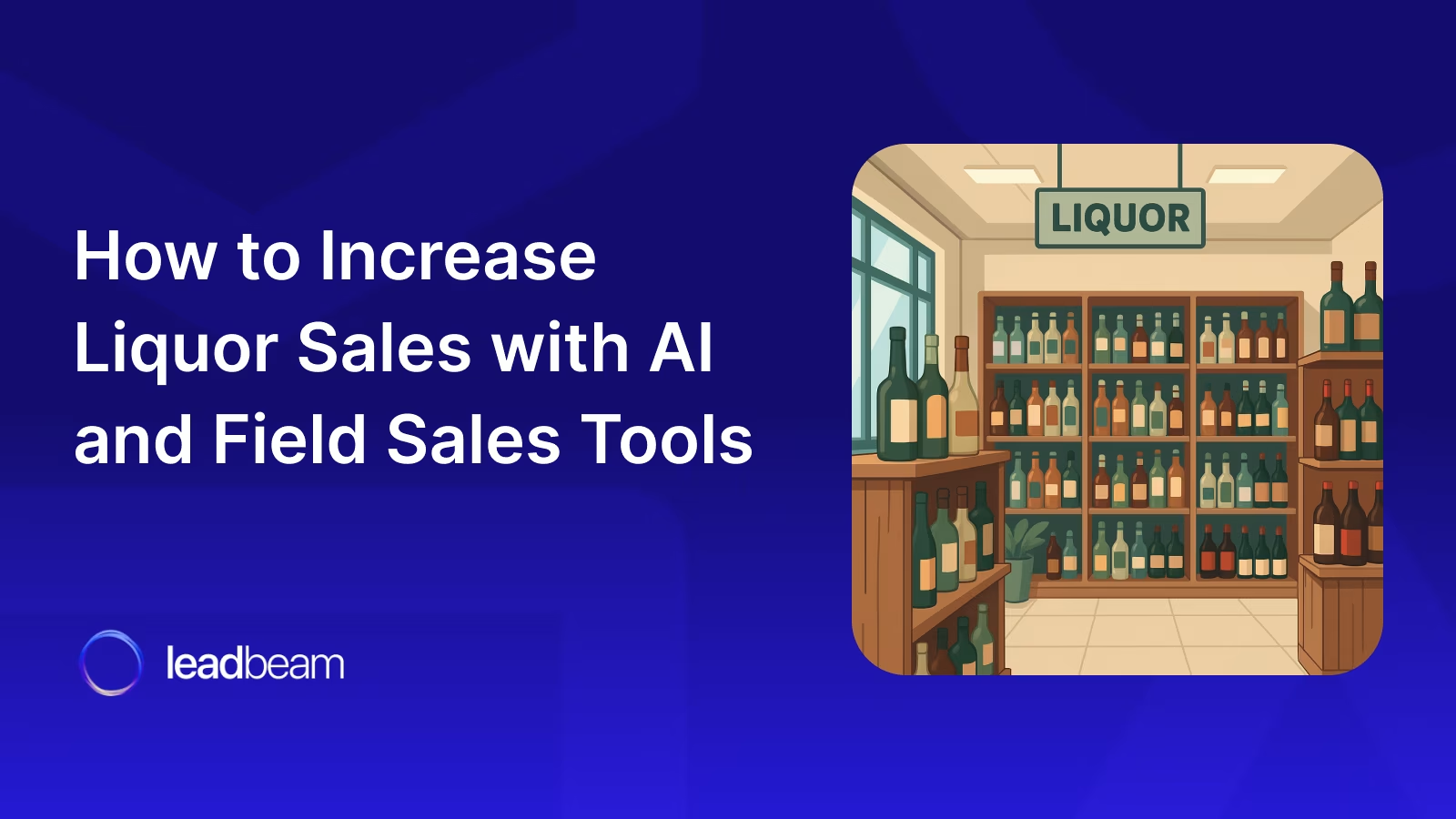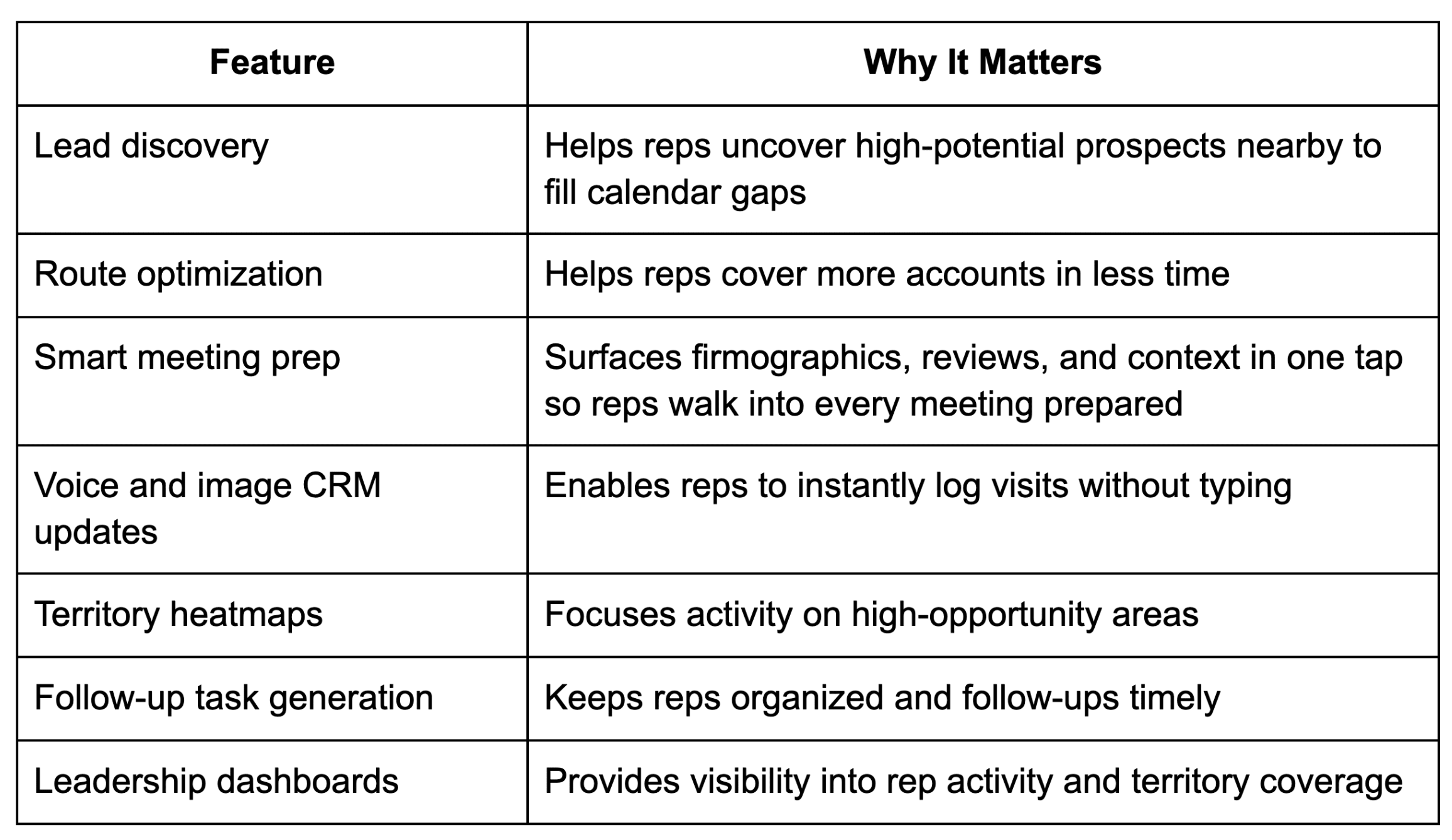
The liquor industry is more competitive than ever. Distributors are under pressure to expand shelf space, retain bar and retail accounts, and grow revenue, all while managing rising costs and shrinking margins.
If you're in charge of a territory, a sales team, or the full distribution operation, you've probably asked yourself: how do we increase liquor sales this year?
The answer isn’t more headcount or bigger discounts.
It’s smarter field execution, starting with how you manage territories, sales reps, and data.
In this guide, we’ll break down what’s changing in liquor sales, share proven distributor strategies, and show how AI-powered field sales software is reshaping the way modern teams operate to close more deals, stay organized in the field, and optimize territory performance.
Over the last decade, liquor sales strategies have shifted significantly. The traditional playbook, focused solely on relationship-building and high-volume buyers, is no longer enough.
Here’s what’s changed:
To succeed, distributors need agility. That means:
These aren’t just nice-to-haves; they’re must-haves for teams looking to grow in a saturated and fast-changing market.
Below are five practical and actionable strategies to increase liquor sales, particularly for distributors managing large field teams.
Not all accounts have the same potential. High-performing reps don’t treat every customer equally. They focus their efforts based on account value and growth opportunity.
Factors to prioritize:
Modern field sales software helps visualize this through heatmaps. With a territory heatmap, reps can easily identify under-tapped zones, prioritize high-opportunity accounts, and focus their time on areas that offer the greatest return.
This leads to more productive routes, higher-value meetings, and smarter account coverage.
Driving between accounts eats into selling time. Reps who plan routes manually often waste time in traffic, double back across zones, or miss nearby opportunities.
With tools like Leadbeam, routes are automatically optimized to:
When reps follow optimized routes:
This is especially valuable in dense urban areas where a few minutes saved per stop can add up to an extra 2–3 visits per day. For rural or spread-out territories, optimization prevents long dead zones and ensures reps stay productive across large geographies.
Many reps update their CRM after work hours—or worse, skip updates altogether. The result?
Modern field sales platforms solve this problem by allowing reps to capture updates in real time.
Reps can:
This removes the burden of admin work, keeps CRM data fresh and complete, and ensures valuable context from every interaction is captured while it's still top of mind.
On average, reps save several hours each week that would otherwise be spent on manual data entry and catch-up tasks.
Sales managers benefit too. They gain real-time visibility into rep activity without waiting for end-of-day updates.
AI plays a growing role in liquor sales strategy. It helps reps stay consistent with follow-ups and account engagement, not just identify new leads.
Capabilities include:
These features eliminate the need for end-of-day catch-up. They reduce the risk of missed opportunities by prompting reps at the right time. Instead of relying on memory, reps receive timely nudges and ready-to-send follow-ups. This keeps conversations moving and increases repeat orders.
Sales managers often operate without clear visibility into field performance. Traditional CRMs can’t answer questions like:
Leadbeam offers a leadership dashboard that tracks:
This gives sales leaders everything they need to coach more effectively, make smart coverage decisions, and ensure that no opportunity slips through the cracks.
Many distributors still assign reps based on geography or legacy account lists. But without intelligent, data-driven territory management, it becomes difficult to:
In 2025, modern territory management requires:
Field sales tools make this easy to implement and scale. When used consistently, proactive territory management leads to more consistent performance and higher sales per rep.
Here’s what a typical liquor distributor setup still looks like for many teams:
This leads to major inefficiencies:
Your competitors are already moving on. They're using dedicated field sales software that simplifies reps’ workflows, improves accountability, and gives managers the insights they need to drive growth.
When evaluating software, focus on features that support the real-life workflows of your field sales team.

Leadbeam is purpose-built with these features in mind. It works out of the box for liquor distributors and other territory-based sales teams who want to increase rep productivity, reduce manual tasks, and gain a strategic view of sales execution across the field.
If you’re a liquor distributor still relying on spreadsheets, manual routes, or delayed CRM updates, it’s time to rethink your sales operations.
Field sales software is no longer a luxury. It is a necessity for growth-focused teams that want to increase liquor sales, improve territory performance, and stay ahead of the competition.
Leadbeam is an AI-powered field sales platform that helps distributors find leads, plan smarter routes, capture data in real time, and manage territories with precision. If you're ready to modernize your field sales process and grow your market share, request a demo today and see what your team could achieve with the right tools.
Leadbeam Blog
Discover tips, strategies, and success stories to empower your field sales team and drive results.